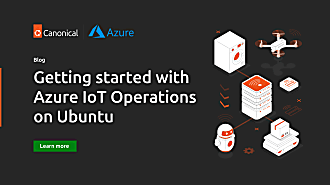Canonical
on 24 April 2015
DataArt’s DeviceHive platform arrives on Azure Marketplace
The industrial Internet of Things (IoT) enables businesses to predict when industrial equipment is going to fail, so that action can be taken beforehand. A leader in this space, DataArt, developed one of the first IoT and big data open sourced platforms, DeviceHive, and published on the Microsoft Azure Marketplace.
DataArt has collaborated with Canonical, the company behind Ubuntu, as well as Microsoft.
“DataArt is an amazing company that glues together different cutting-edge open source technologies into cloud, big data and IoT solutions that can revolutionise industries,” said Maarten Ectors, VP of IoT, next-gen networking and proximity cloud at Canonical.
“With the devices becoming smarter, smaller, and cost points dropping with increasing scale and demand, we are seeing exciting innovation in the IoT market. Smart industrial systems need secure information flow from and to millions of devices and systems to gain and act on data driven insights. DataArt, with their development of the DeviceHive platform, combines specialized technology and vertical expertise that can now be easily consumed via the Microsoft Azure Marketplace,” said Anko Duizer, Director Technical Evangelism & Development at Microsoft EMEA.
DeviceHive integrates with Snappy Ubuntu Core and Juju Charms. Now that it’s available on the Azure Marketplace, anybody can run the DeviceHive charms on Azure in minutes to connect smart devices to a big data back-end almost instantly.
In the industrial world, equipment outage is to be avoided at all costs. But how do you know if equipment is about to break? Lots of industrial equipment: pumps, actuators, fans, HVAC systems will start showing early signs of trouble by vibrating more. Accelerometer-based sensors can capture the vibration profile of the equipment with an on-premises gateway and send the data to be analyzed in Azure. When the vibration profile doesn’t align with the profile of operating equipment, a maintenance alert will be triggered.
DataArt has a simple demo to show how this is possible without conducting an expensive discovery and prototyping study. In the demo, a scaled down version of a motor-powered industrial equipment is the piece of equipment that needs to be monitored. During the demo, normal usage vibrations are following a well determined pattern. To simulate an impeding outage and increase the vibration, a piece of duct tape is placed on one of the blades so that viewers can clearly observe the increased vibration. These variations can be studied on normally functioning equipment and parametrized.
Big data and machine learning solutions can easily detect these anomalies and generate alarms. Azure’s Machine Learning capabilities, as well as integration with Microsoft Dynamics, would allow for an end-to-end predictive maintenance solution.
Learn more about DataArt’s IoT and BigData consulting practice.



